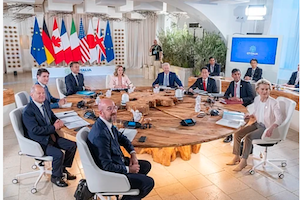India-Pakistan Tensions Escalate as G7 Urges Maximum Restraint and Direct Dialogue

On May 10, 2025, tensions between India and Pakistan escalated sharply, leading to the most serious military standoff since the Kargil War in 1999. The Group of Seven (G7) industrialized nations issued a statement on Friday urging both countries to exercise maximum restraint and engage in direct dialogue to ease the conflict.
The confrontation was triggered by a terrorist attack on April 22 in Indian-administered Kashmir, which killed 26 Hindu pilgrims. India accused the Pakistan-backed militant group "The Resistance Front" of orchestrating the attack. In retaliation, India launched "Operation Sindoor" on May 7, a missile strike targeting terrorist bases inside Pakistan. Pakistan denied involvement and responded on May 10 with a retaliatory military operation named "Operation Bunyan Ul Marsoos," striking Indian military installations.
So far, the crossfire has claimed at least 48 lives and injured dozens more. Multiple cities in India have issued red alerts, while Pakistan has suspended all domestic flights. Both sides have mobilized troops and reinforced their border defenses.
In its statement, the G7 strongly condemned the April 22 terrorist attack and called on both India and Pakistan to exercise maximum restraint and avoid further escalation. U.S. Secretary of State Marco Rubio expressed willingness to assist in facilitating “constructive dialogue” between the two nations. However, U.S. Vice President JD Vance commented that the conflict is “not our concern.” United Nations Secretary-General António Guterres also voiced “deep concern” and reiterated the UN’s willingness to mediate.
The Kashmir region has long been a flashpoint between India and Pakistan, with both countries claiming sovereignty over it. The current escalation poses a serious threat to regional stability. The international community widely fears that continued conflict could lead to a larger-scale war, potentially involving nuclear weapons.
At present, there are no clear signs of de-escalation. The international community continues to monitor developments closely and urges both sides to resolve their disputes through dialogue to prevent further military confrontation.
- 48 reads
Human Rights
Fostering a More Humane World: The 28th Eurasian Economic Summi

Conscience, Hope, and Action: Keys to Global Peace and Sustainability

Ringing FOWPAL’s Peace Bell for the World:Nobel Peace Prize Laureates’ Visions and Actions

Protecting the World’s Cultural Diversity for a Sustainable Future

Puppet Show I International Friendship Day 2020

